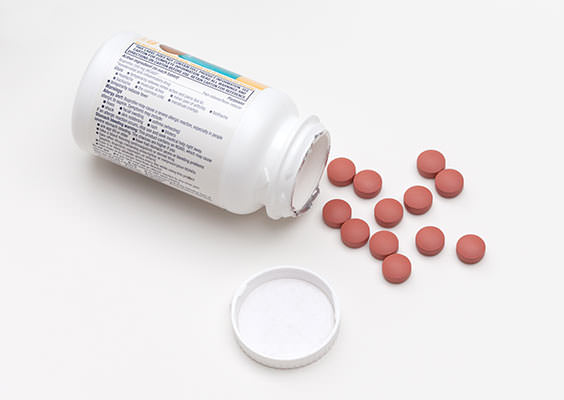
When you have RA, your immune system mistakes your bones, cartilage, and connective tissues for hostile invaders. It attacks and breaks down the joints. The result is a crippling loss of mobility.
But RA doesn’t stop at the joints. It can affect the entire body. About 15% to 25% of RA patients have “extra-articular” RA. This form of the disease can attack your heart, lungs, blood vessels, kidneys and eyes. It can even lead to hearing loss.
Hearing Loss Can Be Linked To Rheumatoid Arthritis
So you can see why I like to test hearing in my RA patients. And a new study from Denmark backs me up on this. Researchers found that patients who have had RA for a long time are much more likely to have impaired hearing.
And drugs to treat RA symptoms make things even worse. Anti-inflammatory pain killers like Advil, Aleve and Motrin are standard medical treatment for RA symptoms. But these drugs are also a common cause of hearing loss.

Mainstream RA Treatments
Mainstream medicine also uses Big Pharma’s steroids and even chemo drugs like methotrexate to treat RA. The newest drugs are “disease-modifying anti-rheumatic drugs” or DMARDs. You may know them as Humira, Remicade and Enbrel. These so-called “biologic” drugs suppress your overactive immune system. But that also makes you vulnerable to serious infections.
Studies have already linked Humira or Remicade to pneumonia as well as lymphoma; tuberculosis; and skin, gastrointestinal, breast and lung tumors.
I don’t prescribe any of those drugs to treat RA. Instead, I help my patients cool the inflammation and protect their joints and hearing with diet and these three powerful nutrients.
Alternative Treatments for Rheumatoid Arthritis And Hearing Loss?
- Better Joints, Stronger Bones
A new study in the European Journal of Pharmacology proves vitamin K2 is effective in treating RA. Doctors gave one group of RA patients 100 mcg of vitamin K2 every day in addition to their RA medications. Another group just received drugs.
After three months, the K2 group had significantly lower inflammation and other signs of RA. They also had higher levels of osteocalcin, an important marker of bone health. And unlike the drugs, there were no toxic side effects of the vitamin.
Sadly, the modern Western diet is deficient in vitamin K2. But you can get plenty of K2 by eating primal foods like our ancestors did. Good choices include grass-fed meats and organ meats, egg yolks, grass-fed whole milk, and traditionally cultured cheeses like Gouda and Brie.

Vitamin K2 supplements come in several different forms called menaquinones. Look for MK-7. That’s the form used in the most recent RA study. It is much more bioactive and stays active longer, so it has time to build up in your blood.
Take 45 to 90 mcg of vitamin K2 per day. And it’s fat-soluble, so take it with a meal to improve absorption.
- Mega Inflammation Fighter
Vitamin E is a powerful antioxidant. It fights free radicals that cause diseases of inflammation (such as rheumatoid arthritis). Studies show anti-oxidants like vitamin E may also help protect the inner ear in RA patients.
In one Israeli study, 66 patients with sudden hearing loss were randomly divided into two groups. One group received standard treatment of steroids with magnesium. The other group got the standard treatment but also took 400 mg of vitamin E twice a day. The difference was dramatic. In the vitamin E group 80% of the patients recovered at least 75% of their hearing. That compares to only a 45% recovery in the control group.
Foods high in vitamin E include cranberries, carrots, almonds, walnuts, eggs, dark leafy green vegetables, wheat germ, and sunflower seeds. Vitamin E oils include palm, coconut and annatto.

But chances are you’re not eating enough nuts, fruit and seeds every day to get all of the vitamin E your body needs. You’ll probably want to supplement. But make sure you get the right kind.
There are eight forms of vitamin E: four tocopherols and four tocotrienols. They’re all antioxidants, and each has its own unique health properties. But the tocotrienols give vitamin E its antioxidant punch. Research shows one tocotrienol boosts your cells’ antioxidant strength by 300%.
Most vitamin E supplements only contain one or two tocopherols. That’s not enough. Make sure you get all eight forms. Some vitamin makers will list each tocopherol and tocotrienol form individually. Others may list all of the forms as “mixed tocopherols and tocotrienols.”
And stay away from anything labeled d-alpha or especially dl-alpha tocopherol. The “dl” means it’s synthetic.
Try to get at least 400 IU a day. And like all fat-soluble vitamins, take them with a meal.
- Protection For Your Ears
New studies show a powerful amino acid can protect your hearing from loud noises. N-Acetyl-Cysteine (NAC) is so effective our military uses it to protect soldiers from blast noise from gunfire and explosions.

In one U.S. study, 600 Marines at Camp Pendleton took 900 mg of NAC three times a day over six months. Every week they were exposed to noise from 300 rounds of M-16 rifle fire. An amazing 70% of the Marines taking NAC had less hearing loss from the gunfire.
In your body NAC boosts the production of a powerful antioxidant called glutathione. And that helps repair the inner ear damage done by loud noises.
NAC is available as a supplement in most health food stores. I recommend taking at least 600 mg a day.


